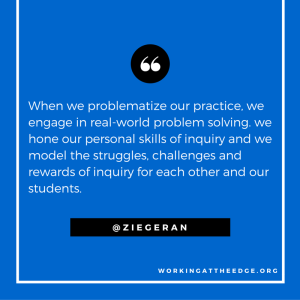 I read a post the other day from Ross Cooper titled Inquiry is king. Here’s why… In any progressive vision for learning where students exercise agency, inquiry is a non-negotiable, and this needs to be the direction where we are headed for our schools and classrooms. I do wonder, though, how we as educators are practicing and modeling inquiry. Is inquiry a critical part of the professional learning cultures within our schools and districts? We have to be masters of the inquiry process if it is to become the norm in our classrooms. From my experiences, there is one thing we can do as educators that will fuel our shift to inquiry in the classroom:
I read a post the other day from Ross Cooper titled Inquiry is king. Here’s why… In any progressive vision for learning where students exercise agency, inquiry is a non-negotiable, and this needs to be the direction where we are headed for our schools and classrooms. I do wonder, though, how we as educators are practicing and modeling inquiry. Is inquiry a critical part of the professional learning cultures within our schools and districts? We have to be masters of the inquiry process if it is to become the norm in our classrooms. From my experiences, there is one thing we can do as educators that will fuel our shift to inquiry in the classroom:
Educators must become skilled at problematizing their practice. Change begins with a good question about practice.
When we problematize our practice, we engage in real-world problem solving. we hone our personal skills of inquiry and we model the struggles, challenges and rewards of inquiry for each other and our students.
Teaching Inquiry to Educators
As a Clinical Adjunct Professor of Education at Moravian College, I get to help teachers and prospective leaders understand the power of inquiry through Teacher as Inquirer. We focus on the development of the educator as an inquirer while transferring those skills to creating technology-rich learning opportunities rooted in inquiry. I’ve been teaching this course for three years. It amazes me how little educators know about inquiry at the start of the class, but it is inspiring to see how excited they are – about inquiry in both their practice and the classroom – by the end of the semester. I am fortunate to get to see what happens when educators problematize their practice and embrace an inquiry stance to solve those real-world problems.
Problematizing My Own Practice
This past week our full administrative team participated in the #shadowastudent challenge. I carved two full days out of my schedule to participate, shadowing a 3rd grade students and an 8th grade student. Shadowing these students was a powerful experience – one that I will continue several times throughout the year. What made it powerful? The new questions that emerged from the experience…
- Why school?
- What can we do to better support our teachers and principals to provide the best learning opportunities for our students?
- What if our learners had more agency over what, how, when and where they learned?
- How do we provide a physical learning environment conducive to inquiry?
I am looking forward to debriefing with the full administrative team – problematizing our practice in an effort toward improving our practice.
I also found this wonderful short film from Tiffany Shlain titled The Adaptable Mind via the Character Day web site. As our organization is working to revise our beliefs and vision, this film prompted lots of big, audacious questions about the future of schooling.
- What’s a great example of a 21st century mind in action?
- What are the skills needed for a world that’s constantly changing?
- How are we doing at helping our learners develop the qualities machines don’t have: curiosity, creativity, initiative, multi-disciplinary thinking and empathy?
- How do we do this while managing the current financial and political constraints of our system?
These are my questions at the moment. We will add more from our stakeholders to fuel the inquiry process around our own practice in an effort to improve what we do for our learners and families.
Inquiry is king – not only in the classroom, but in the faculty room, the principals office, the district office and the board room! (How do we take effective inquiry to our state and federal policy arenas?) Let’s see that inquiry permeates the system, for when it does, it will become the norm in our classrooms.
Want to learn more about the inquiry process? I highly recommend Comprehension & Collaboration by Stephanie Harvey and Harvey Daniels. Check it out and become a better inquirer!
How do you problematize your practice?
Connect with Randy on Twitter and on the TLTalkRadio podcast!
Get new content delivered to your inbox and the ebook 3 Key Principles of Digital Transformation. The ebook contains valuable information from my experience leading a digital transformation and working with a variety of stakeholders over the past decade.
- A silver lining - January 22, 2022
- Is our use of tech working against us? 🤔 - September 8, 2021
- What’s NOT going to change in the next 10 years? 🤔 - September 7, 2021
[…] The one action all educators must take to fuel the classroom shift to inquiry… – Working… […]